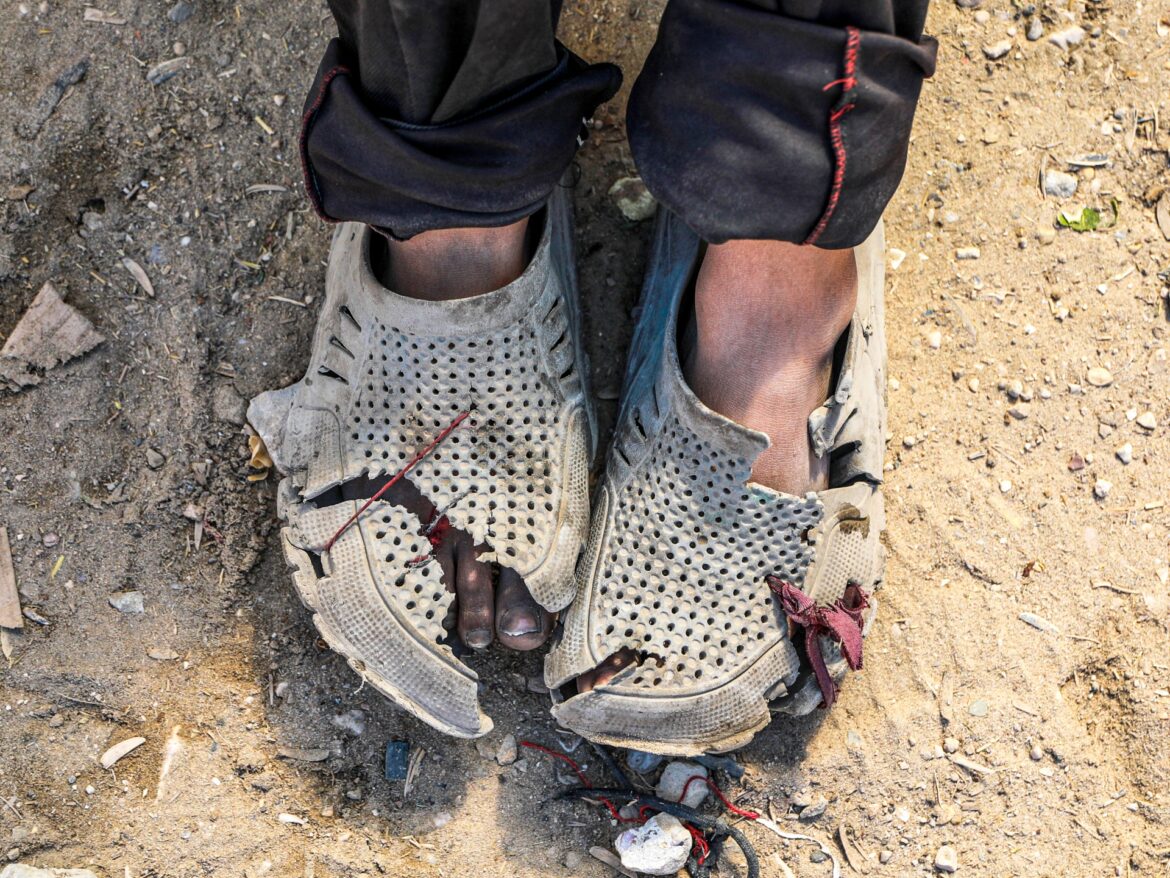Deir el-Balah, Gaza, Palestine – In a displaced persons camp, a woman stands in front of a tent, hanging her laundry on a line. Rawan Badr’s face is tired as she carefully places each item of clothing.
A movement makes him look up, it’s his six-year-old daughter, Massa. Massa is a happy little girl, busy playing and commenting on everything with energy.
Her mother says she also loved dressing up before the war: the bigger and more colorful the dresses, the happier she was to show them off to her friends.
‘I’m lying. We won’t come back’
The condition of the clothes on Badr’s clothesline is miserable: faded, stretched, patched and frayed pants and shirts lie limply next to each other.
The 34-year-old woman and her family – her husband Ahmed, 38, and their children, Yara, 11, Mohammed, Massa, 8, and Khaled, 3 – were displaced from Gaza. City in October last year.
Badr only collected a few items when they left, assuming they would be able to return home soon. Several trips later, Badr is on the verge of despair.
“I left everything behind,” she says. Today, her children’s clothes are falling apart because they are worn for days and washed on other days.
“Sometimes,” says Badr, “Massa asks me questions about his clothes. She remembers every piece. She asks about her red Eid dress. She asks about her pajamas which she loves. I don’t know how to answer.
“Every day I tell him we’ll go home ‘tomorrow,’ but I lie. We will not come back. » Badr stops talking to check the food she has on an open fire.
Like all parents, when Badr has money saved, she tries to buy things for her children.
But in Gaza, her choices are limited to used clothes that are usually the wrong size because there is nothing else available.

She then has to take them to the market, where a tailor from one of the makeshift stalls can alter them slightly to make them fit.
At home, when things get torn or worn out, she does her best to mend them herself using a needle and thread she keeps in a tin can.
When she was forced to buy a pair of shoes for Massa one day – for about $40 – the family couldn’t afford to buy food for a week.
Between necessity and a little joy
Today, two of the most active artisans in Gaza are the tailors who do alterations and mending and the “eskafis” who repair shoes. Both can be seen on the sidewalks of the Deir el-Balah market in central Gaza.
The market is full of displaced and tired people wandering around. Some of them are looking for affordable food. Others look for other essentials.

Many of them can only watch because they have no money to buy anything.
On a street corner, Raed Barbakh, 27, has set up a stall and is mending a pair of small pants that resemble those of a six-year-old child, while a man and a woman stand in front of him, waiting to take. pants at home.
Barbakh himself is displaced, having come to Deir el-Balah with his most essential possession: his sewing machine.
“I work from 7 a.m. to 7 p.m.,” he says. “There are so many customers whose clothes are constantly torn or need to be altered.
“For the first time in 10 years of being a tailor, I hate my job. A few days ago, a displaced man from Gaza City came to me with one of his shirts and asked me to make two shirts for a three-year-old child.

The man, Barbakh said, was willing to sacrifice one of his rare items of clothing to make his little son happy. Without a job, this displaced man probably won’t have money to buy another shirt anytime soon, he adds.
“Every day, there are many people who come to have their clothes repaired. There are no new clothes to buy. These are all old, worn out clothes that need repair or alteration.
“Before, I made clothes from scratch, cut from beautiful new fabric,” sighs Barbakh.
“Exhausted from finding solutions for children”
Next to Barbakh, on the sidewalk, is a portable shoemaker’s stall where Saeed Hassan, 40, sits surrounded by shoes that people have brought to him to mend.
He holds up a shoe and examines it carefully to see where it can be repaired.

His hammer and nails sit next to a bag that looks large enough to hold all of his equipment in case he wants to change workplaces.
Hassan is from Deir el-Balah and works mainly in the market, although he sometimes walks around the IDP camps if the situation is calm in the market.
Sometimes, he said, people bring him shoes that “can’t be repaired.” But they ask me to try to fix them in any way possible. So I’m going to end up adding pieces of fabric to try to fill in the holes, but it’s not easy at all.
One day, a man came to Hassan with some pieces of moss and asked him to turn them into shoes for his children.
“I can’t do this!” Hassan laughs. “Making shoes is not easy and requires its own tools. Additionally, a foam shoe will not last long. Look at the streets. Our destroyed streets can destroy iron.
“I have never seen things as bad as they are today. People are exhausted by the intensity of just finding solutions for children.”




